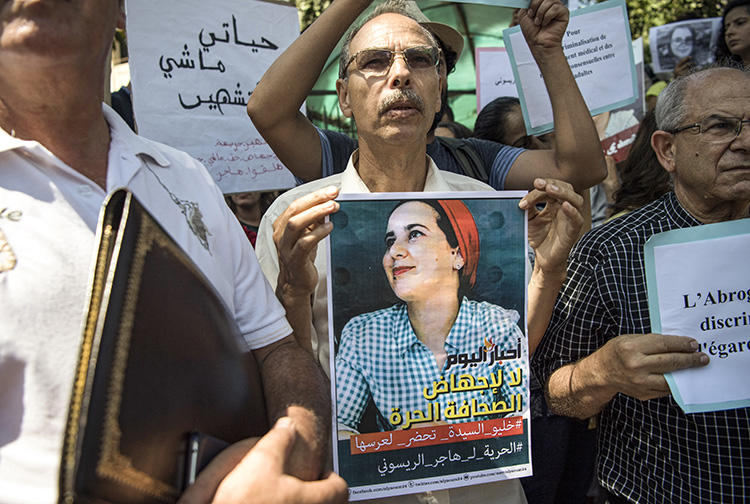Moroccan security forces arrested Hajar Raissouni, a reporter for independent news website Akhbar al-Youm, on August 31, 2019, as she was leaving her doctor’s office with her fiancé in Rabat, according to her employer and Huffington Post Maghreb. Akhbar al-Youm reported that plainclothes agents also arrested her fiancé, the doctor, and two medical staff from the office.
Akhbar al-Youm and Human Rights Watch reported that Raissouni was barred from seeing a lawyer before appearing in front of a judge and a prosecutor on September 2. According to Human Rights Watch, Raissouni’s fiancé, doctor, and the two medical staff were charged at that hearing, in Rabat’s Court of First Instance, with complicity in an illegal abortion, and her fiancé was charged with sex outside of marriage and complicity in an illegal abortion, and Raissouni herself was charged with sex outside of marriage and having an illegal abortion.
Abortion is illegal in Morocco without a medical reason, as is sex outside of marriage, and authorities in 2015 used the latter charge against journalist and press freedom advocate Hicham Mansouri, CPJ reported at the time. According to Akhbar al-Youm, authorities used Raissouni’s lack of a written marriage contract–which the couple was waiting on in advance of their wedding–as a basis for the charge.
Raissouni is currently detained at El Aarjate prison in Sale, near Rabat, according to a September 5 report in Akhbar al-Youm. Raissouni appeared in court September 9 alongside her fiancé, the doctor, and the two medical staff, according to the Associated Press and Human Rights Watch. Both reported that the court rejected Raissouni’s request for pretrial release, and that she faces up to two years in prison if convicted.
According to a September 4 article in Akhbar al-Youm and Bloomberg correspondent Souhail Karam, writing about the arrest on Twitter, Raissouni sent a letter from the prison saying that authorities interrogated her about topics including her political writing; her uncle Ahmed Raissouni, who was formerly involved with the Justice and Development Party, an Islamist Moroccan political party; and one of her colleagues at the newspaper, Afaf Bernani, as well as her uncle Suleiman Raissouni, who is the paper’s editor-in-chief, according to Human Rights Watch. In a separate Twitter thread, Karam wrote that she was known for her coverage of protests by the anti-corruption movement Al-Hirak al-Shaaby, in the Rif area in the north of the country.
Recent bylines from Raissouni included articles focusing on political and social issues within Morocco, including a series of interviews with Ahmed al-Zefzafi, father of imprisoned Al-Hirak protest movement leader Nasser al-Zefzafi. Three journalists were imprisoned in Morocco as of December 1, 2018, in connection with their reporting on the Al-Hirak protests.
Taoufik Bouachrine, Akhbar al-Youm’s publisher, is currently imprisoned on sexual assault charges that local advocates and journalists described as politically motivated retaliation for him and his newspaper’s critical reporting.
Bernani–the colleague authorities questioned Raissouni about–was named by authorities as one of Bouachrine’s victims and was imprisoned in April 2018 after she denied that Bouachrine assaulted her and accused Moroccan authorities of falsifying her testimony to say that she had been one of his victims, according to the private local news website Morocco World News.
Akhbar al-Youm also separately quoted Raissouni’s lawyer as saying that authorities took her to a hospital after her arrest and subjected her to a medical examination against her will.
CPJ emailed the Moroccan consulate in New York for comment in the case, and was told to contact the Embassy of Morocco’s Cultural Attache in Washington, D.C. CPJ called the Embassy of Morocco in Washington, D.C., and left a message for the attache’s office, but they did not return the phone call.
The National Moroccan Journalists Syndicate, a professional an advocacy organization working with Moroccan journalists, issued a statement condemning the “defamation” of Raissouni in relation to her arrest and said that it had hired lawyers to follow the case.
Raissouni’s arrest comes as part of a broad crackdown on critical journalism in Morocco, including her newspaper’s publisher, Bouachrine. Moroccan journalists described to CPJ a climate where hacking, surveillance and retaliatory charges — often including adultery or other charges implicating the journalist’s personal life — are used against journalists.
